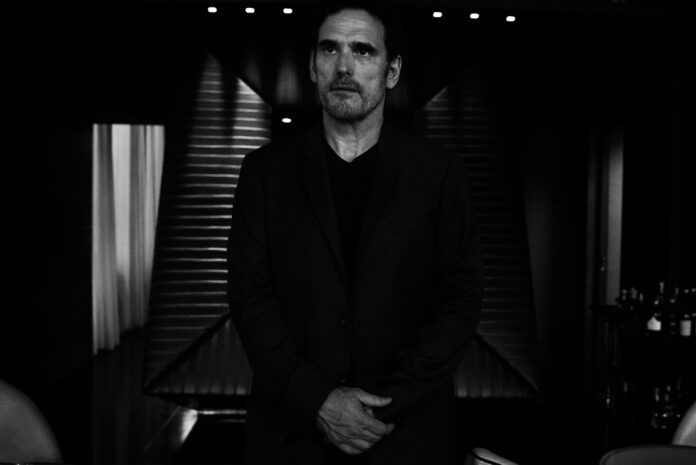Federico Grandesso interviews the film star, director and artist who was celebrated in Venice.
The Fondazione Mimmo Rotella Award was created in 2001 from an idea by the artist and poet who is best known for collages made from torn advertising posters in a medium which he called “double décollages”. Rotella wanted to celebrate the link between the visual arts and cinema.
The prize is awarded every year to a person who, over the course of their career, has distinguished themselves as a major protagonist in the world of cinema, leaving an indelible mark on the medium, just as Rotella did with his art.
Could you share your journey as a painter? What has been your experience been in the world of contemporary art?
Art has been an integral part of my life since childhood. It has always been a part of my life, which was deeply rooted in my family’s visual background rather than a musical or theatrical one. The seeds of creativity were sown in me and it’s a legacy that traces back through my paternal family lineage. I can vividly recall being just six years old, gazing at my uncle’s comic strips. My uncle, Alex Raymond, was a renowned cartoonist and the creator of FLASH GORDON. Meanwhile, my father was an accomplished oil painter, specializing in portraiture. Even my grandmother had a talent for painting.
Growing up in this environment, it was only natural for me to be drawn to the world of art. I was always engaged in creative pursuits. From a very young age, I would document my thoughts and experiences through drawings, paintings, collages, and diaries. I remember carrying these visual diaries with me, even when I was just three years old.
Whether I was traveling to places like Cambodia, Thailand, or Miami for film shoots, I always had my art supplies on hand. I have a distinct memory of traveling after the events of 9/11. I was on a flight to Los Angeles while carrying my art materials, including color boxes and scissors. In the post-9/11 climate, security personnel were understandably concerned about these items, which were essential to my artistic process.
I was determined to pursue this artistic path, but occasionally, I would take breaks. However about a year ago, I established a habit of regularly practicing painting and drawing. Perhaps not every day, but at least every other day. Even when I was engrossed in filmmaking, I made sure to dedicate time to my art. It’s not just a hobby; it holds immense significance for me. I’ve had the opportunity to exhibit my work, but what truly matters is the ongoing practice and the discoveries that unfold along the way. What’s interesting is that it’s a rather solitary endeavor. There’s a directness in creating this type of art that you don’t find in cinema. Cinema involves a lengthy process to achieve results and requires a significant budget, as well as the coordination of numerous elements. It’s a collective effort, involving the organization of many people around a project. In the realm of fine art, I can simply sit in front of a canvas or even sketch away on an airplane or find inspiration in my own kitchen. Of course, it sometimes demands more time and effort. I have a small studio in New York (an Old Church) where I go to work. What’s most incredible is that it doesn’t make me feel lonely; in fact, it’s quite the opposite. Sometimes, I have the opportunity to meet other artists who are also painters, forming friendships with many artists who work in entirely different circles and create different types of art.
Can you talk about your past and upcoming exhibitions?
I did an exhibition in Berlin about two years ago in collaboration with Harold Falckenberg, a remarkable collector and curator, known for his unconventional approach. He taught me a lot about art. We have known each other for some time now, as he collected some of my art. He is a bit eccentric and enjoys breaking the rules, much like myself. I also have an appreciation for filmmakers like Lars von Trier, who challenge conventions. There is a Danish phrase he used to say: ‘Husk go shusk’, which translates to ‘remember to keep it messy’. It can also be interpreted as “to draw outside the lines”. These concepts resonate with me as I create art. Currently, I’m contemplating the work of Mimmo Rotella, to whom I was invited to pay tribute. Rotella is a remarkable artist, and I particularly admire his contributions to the field of collage.
Considering when you first began your career and the current year, 2023, with the significant developments in the field of acting, how do you perceive the evolution of your profession? And how has technology influenced the field of acting?
I don’t know. The fundamental nature of acting has changed so much. There’s still good acting, bad acting, and sometimes, bad acting can even be good, right? I don’t really care much about technology; I’m more interested in human beings. Technology is a tool you can use to your advantage, but I don’t think it can replace real actors with artificial ones. I don’t believe AI can replace the human experience; I think AI can be used by humans to simulate these experiences. I’m not an expert, but I don’t see AI as a Frankenstein monster created by us. Frankenstein was made from human materials; his brain was harvested from a criminal. It wasn’t created automatically. So, that’s my point of view.
Do you have plans to direct more films in the future?
I’m currently working on something, because directing has been a truly fantastic experience for me.






